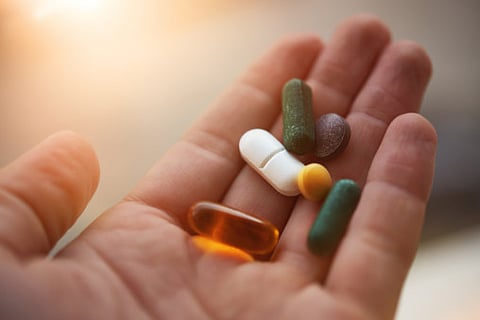UAE ministry warning: Do not use these dietary supplements, medicines
Ministry has issued warning on the use of some dietary supplements due to their alarming side effects

Abu Dhabi : The Ministry of Health and Prevention, MoHAP, has issued public warnings on the use of dietary supplements due to their alarming side effects, including sharp drop in blood pressure, anxiety, irritability, nervousness and rapid heartbeat.
The ministry also warned against the interaction between some ontraceptive medicines and an anti-epileptic drug.
Recently, the ministry recalled various products for violations and failing to meet safety standards.
To name a few, these include food supplements that contain salmonella bacteria, drugs used to relieve heartburn and indigestion, and a medical device used in medical image management.
Speaking on the announcement, Dr Amin Hussain Al Amiri, Assistant Under-Secretary for the Ministry's Public Health Policy and Licensing Sector, emphasised that it is part of the ministry's mandate to protect community health by issuing circulars warning people against the use of fake food supplements and recalling products, including substandard medical devices, from the market due to their dangerous side effects.
In a press release issued by MoHAP, Dr Al Amiri said: "The Ministry's laboratory for Quality Control and Research of Medical and Health Products has found out that the Shedfat Maxx capsule, a weight loss product, produced by Shedfat LLC contains yohimbine.
"The chemical substance, which is banned worldwide, causes dangerous drop in blood pressure, psychological symptoms such as anxiety, irritability, nervousness, and rapid heartbeat." He asked concerned entities to recall the product, if found, and mentioned that this medicine is not registered with the department.
On contraceptive drugs, Al Amiri added: "Sanofi, has informed us about the update of the label of Depakine, an anti-epileptic medicine containing sodium valproate and valproic acid forms that can interact with estrogen-containing contraceptives. Depakine, which contains valproate, does not affect the effectiveness of estrogen-containing products. However, estrogen containing products can accelerate the elimination of valproate from the body and might lead to a decreased effect."
"Depakine is registered with the Ministry's Drug Department but health care practitioners are directed to take caution when prescribing the medicine to their patients. It is safe to use and has not been recalled from the market. These warnings are added to the drug labels only. To report its side effects, the public is encouraged to fill out a form available on the Ministry's website," the press release added.
"The US Food and Drug Administration, FDA, has recalled Kratom products sold on websites krakenkratom.com, ciosa.comsoulspem, and phytoextractum.com. These products containing kartom herb, scientific name Mitragyna speciosa, are sold as a food supplement online in the form of capsules, tea, and coffee.
According to the US FDA, these products may contain salmonella bacteria, which may cause poisoning and other symptoms, such as fever, diarrhea, nausea, and abdominal pain.
The elderly and people with weak immunity are more susceptible to the effects of the bacteria.
With its stimulant effects, kartom has similar characteristics as opium. As per the US FDA, there is no evidence proving that kartom is safe or effective in treating any disease. Some people have taken the product to treat chronic pain, and to treat the symptoms of opium recall and recently it has been used for recreational purposes.
The recalled products, according to the US FDA, are produced by the following companies: PDX Aromatics; DBA Kraken Kratom; Phytoextractum; and Soul Speciosa.
An action should be taken to recall these products from the market and prevent their circulation and import, the ministry said. "The products are not registered with the Drug Department."
The Saudi Drug and Food Administration has recalled one batch of Omacid Chewable tablets produced by Oman Industries Co. National Pharmaceutical. The medicine is used to relieve heartburn and indigestion but it has not passed the Assay test. The product is registered in the GCC Centrally. The manufacturer said the product is not available in the UAE. To protect public safety and patient health, the Department has nonetheless taken precautionary measures in case it has entered the local market.
General Electric has issued a warning about the use of its ‘Centricity Universal Viewer,' a medical device for medical image management, because of the loss of some radiological images after the tests. The company stated that some hospitals in the country are already using the device. The company will communicate with its suppliers to provide a free of charge system update to fix the issue. This product is not registered with the Ministry's Drug Department.
In case of side effects resulting from the any medical drugs or devices, an individual may call the Ministry at 04-3201448, or fax at 02-3201947, or e-mail at pv@ moh.gov.ae


